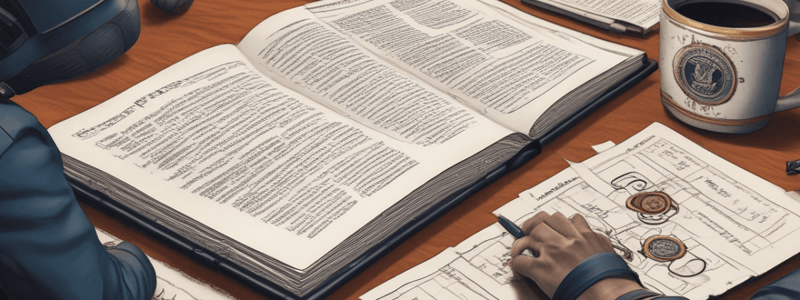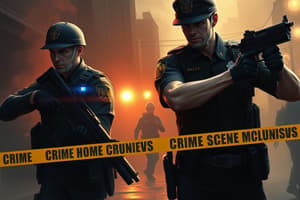Podcast
Questions and Answers
What is the appropriate way to record statements made by witnesses or suspects?
What is the appropriate way to record statements made by witnesses or suspects?
- In your own words
- Summarizing the main points
- Using abbreviations and short forms
- In their words, verbatim (correct)
What is the best practice when it comes to avoiding investigator bias?
What is the best practice when it comes to avoiding investigator bias?
- Consider and evaluate all available information (correct)
- Build a case for the chosen suspect
- Select evidence to support your hypothesis
- Ignore information that points away from guilt
Which writing style is appropriate for police reports?
Which writing style is appropriate for police reports?
- Second person usage
- First person usage
- A mix of first and third person usage
- Third person usage (correct)
What is the appropriate way to handle confidential or restricted information in a police report?
What is the appropriate way to handle confidential or restricted information in a police report?
Which time format is used in police reports?
Which time format is used in police reports?
What should be done with unverified facts in a police report?
What should be done with unverified facts in a police report?
What is the purpose of note-taking in investigations?
What is the purpose of note-taking in investigations?
How do handwritten notes differ from reports and briefs?
How do handwritten notes differ from reports and briefs?
What impact does 'natural selectivity' have on note-taking?
What impact does 'natural selectivity' have on note-taking?
Why is it recommended to never alter a notebook sketch once it's made?
Why is it recommended to never alter a notebook sketch once it's made?
What is a specific detail that should be recorded regarding vehicles in investigations?
What is a specific detail that should be recorded regarding vehicles in investigations?
Which factor impacts note-taking by affecting what an investigator can recall?
Which factor impacts note-taking by affecting what an investigator can recall?
What does a Crown Brief primarily serve as a basis for?
What does a Crown Brief primarily serve as a basis for?
Why is it important for notebook entries to be made chronologically?
Why is it important for notebook entries to be made chronologically?
What detail is typically found on the cover page of a notebook?
What detail is typically found on the cover page of a notebook?
What aspect is crucial for notes to reflect in order to enhance investigator credibility in court?
What aspect is crucial for notes to reflect in order to enhance investigator credibility in court?
Flashcards are hidden until you start studying
Study Notes
Note Taking
- Creates a permanent record of an officer's observations and activities during an investigation
- Acts as an "aide-memoire" to refresh a witness' memory
- Enhances officer credibility while testifying in court
Report Writing
- Generates a permanent record of an investigation's findings
- Conveys information about one or more aspects of a case
- May be disseminated internally and to external agencies
Crown Brief
- Contains the findings of an investigation and the evidence of the case
- Used as a basis for prosecuting offenders
- Provides disclosure of evidence to the defense
Similarities of Notes, Reports, and Briefs
- All require absolute accuracy
- All information contained needs to be factually supported
- All are subject to release under Freedom of Information legislation
- All become property of the police service for whom they have been created
Note Taking Accuracy
- Accuracy reflects an investigator's attention to detail
- Sufficiency reflects an investigator's thoroughness
- Consistency reflects an investigator's credibility
- Notes must be made contemporaneously with the investigation
Note Books
- Bound book with sequentially numbered pages
- One notebook unless policy permits separate notebook for complex investigations
- Every line must be written on, or crossed out with a single-line strikethrough and initial
Notebook Entries
- Entries made chronologically (identify late entries as such)
- Written in blue or black ink
- Write on every line or cross it out with a single-line strikethrough and initial
- Never remove pages from notebook
Factors Impacting Note Taking
- Perception - subjective
- Memory – can only record facts that can be recalled
- Time constraints
- Volume of information
- Natural selectivity – not all people will assign identical priority to issues
- Anticipation of importance
Recording Information
- Record full details of victims, witnesses, persons of interest, suspects, and accused persons
- Record information in point form if necessary
- Record information about vehicles, including year, make, model, colour, license number, and distinguishing features
- Record information about property, including type, nature, physical description, and serial numbers
Recording Observations, Activities, and Information
- Record in as much detail as possible what you see, hear, smell, touch, and learn
- Record what you did and what you were told
- Vary with the circumstances of the individual investigation
Recording Important Times
- Time of dispatch to event
- Time of arrival at scene
- Time of arrest and administering charter rights
- Start and end times of statements
- Times of actions made without warrant and reasons for doing so
Notebook Sketches
- Rough and not-to-scale
- Include compass orientation and accurate measurements
- Diagrams of crime scenes or significant pieces of evidence
- Highly recommended whenever appropriate
Who Said What?
- Record statements made by witnesses, persons of interest, suspects, and witnesses
- Statements should be verbatim (in their words)
- Record prior inconsistent statements and admissions/confessions
Use of Inappropriate Language
- Avoid using slang in notes
- Use of short forms or abbreviations is appropriate
- Eliminate investigator bias
Report Writing
- Police reporting is not standardized (paper-based, computerized interactive, and smart form reporting)
- Tombstone information includes incident or occurrence number, time, date, and location of occurrence
- Narrative summary answers the questions who, what, where, when, and how?
- 12 vs 24-hour clock usage
Objectivity in Reporting/Notes
- Never include personal views or beliefs
- If you can't prove it, describe it
- Identify unverified facts by source
- Identify confidential/restricted information
Crown Briefs
- Cover page
- Index
- Information
- Remand/Release documents
- Main page
- Witness list
- Synopsis
- Exhibits
- Criminal Record of Accused
Studying That Suits You
Use AI to generate personalized quizzes and flashcards to suit your learning preferences.



